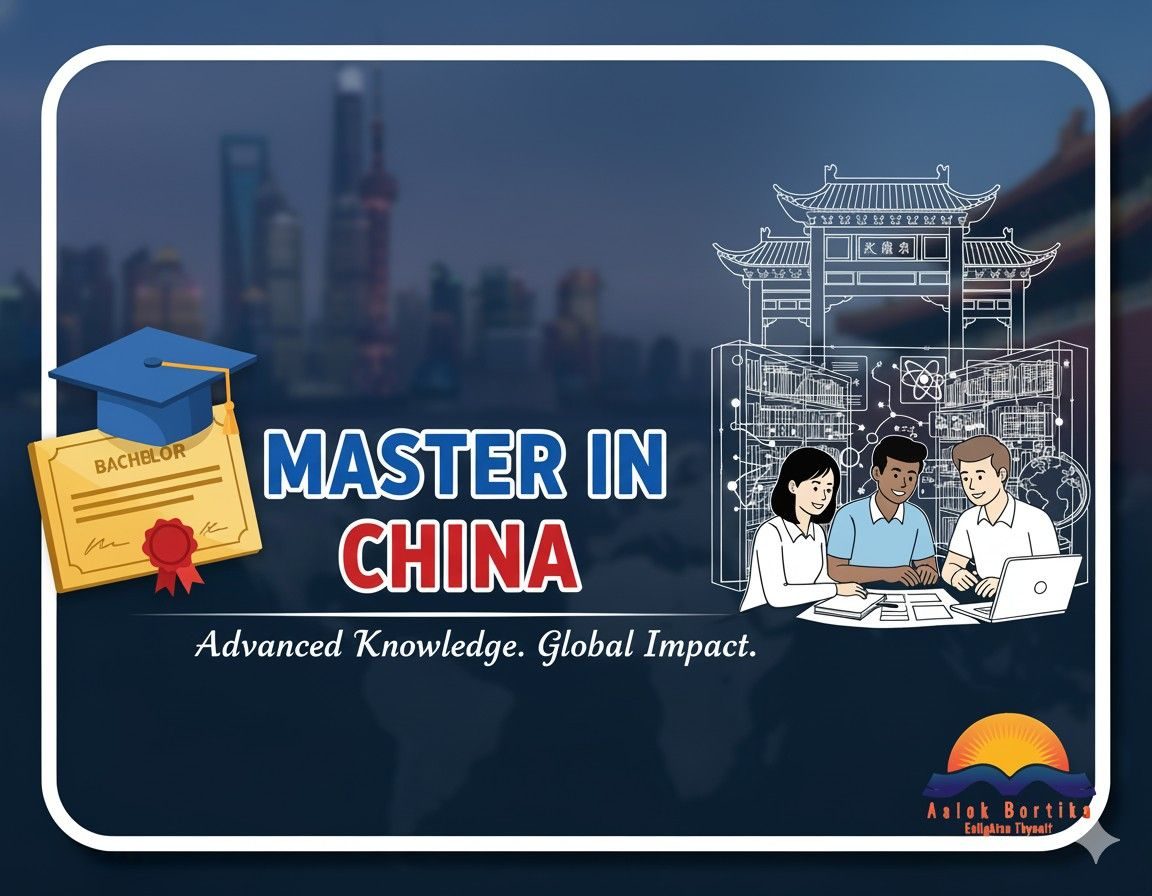Available Programs in Chinese Universities
China has emerged as one of the most sought-after destinations for international students seeking quality education, cultural immersion, and exciting career opportunities. With world-class universities, affordable tuition, and generous scholarship programs, studying in China offers an incredible opportunity to gain a globally recognized degree while experiencing one of the world’s oldest civilizations. The country has invested heavily in its education system, and China produces one of the largest bodies of graduates every year with the majority excelling in science and technology, engineering, medicine, and information technology. Whether you’re seeking a full degree or a short-term cultural experience, there’s a program in China for you.
Here’s a look at the diverse range of programs available to foreign students:
Degree Programs
China offers a comprehensive range of degree programs for international students, such as Diploma, Bachelor, Masters and Doctoral Degree.

Diploma Program: While China is famous for its prestigious bachelor’s and master’s degrees, its Diploma programs, often referred to as Associate Degrees or Higher Vocational Education (HVE), offer a highly practical and affordable pathway for international students. These programs are ideal for those seeking to acquire job-ready skills quickly, often serving as a steppingstone into the Chinese job market or further academic study.
Focus and Duration: Chinese diploma programs typically concentrate on vocational skills and practical application, distinguishing them from the more theoretical approach of a four-year bachelor’s degree.
- Duration: Most diploma programs in China last two to three years of full-time study.
- Practical Curriculum: The education model often integrates academic classes with extensive hands-on training and internships to ensure graduates are immediately employable.
- Dual Certification: Many Higher Vocational Colleges encourage students to obtain a professional vocational qualification certificate in addition to their academic diploma, enhancing their competitiveness.
- Affordability: Tuition fees for diploma programs are generally significantly lower than those for bachelor’s degrees, making them a budget-friendly option.
Popular Fields of Study: Diploma programs are concentrated in high-demand technical and service sectors, directly aligning with China’s modern industrial needs.
Sector | Example Programs/Specializations | Focus |
Engineering & Technology | Electromechanical Integration, Industrial Robot Technology, Mobile Internet Technology, Architectural Decoration Engineering Technology | Focus on practical skills for manufacturing, automation, construction, and emerging tech maintenance. |
Business & Trade | E-Commerce, International Trade, Logistics Management, Marketing, Accounting | Training for operational roles in global supply chains, Chinese digital commerce, and financial services. |
Health and Medicine | Nursing, Rehabilitation Therapy Technology, Medical Examination Technology, Optometry Technology | Focus on practical clinical and support skills for the healthcare system. |
Culture and Service | Tourism Management, High-Speed Railway Passenger Service, Culinary Arts/Cooking Technology | Preparing students for China’s massive and rapidly growing tourism and service industries. |
Design and Arts | Graphic Design, Visual Communication Design, Interior Art Design | Emphasizes software proficiency and creative application for professional projects.
|
Key Considerations for International Applicants
- Language Requirement: Unlike some English-taught undergraduate programs, most Chinese diploma programs are taught in Chinese to ensure smooth integration into local workplaces.
- Requirement: A minimum HSK Level 4 (Chinese Proficiency Test) is generally required for direct entry into a three-year diploma program.
- Language Preparation: Many vocational colleges offer a mandatory Chinese language preparatory course (usually six months to one year) for international students who do not meet the language proficiency threshold.
- Further Study (Articulation): A diploma can often serve as a bridge to a full degree. Many colleges have agreements that allow graduates to transfer their credits and directly enroll in the third year of a related bachelor’s degree program at a partner university. This “3+2 model” offers a cost-effective and staggered entry into a higher degree.
- Vocational Certification: Students in vocational fields are often trained for specific Chinese vocational skill appraisals. Achieving these certificates alongside the diploma is highly valuable for seeking employment within China, particularly with Belt and Road Initiative (BRI) related companies that value practical, certified expertise.

Undergraduate/bachelor’s degree: China’s rapid ascent in global education has made its Bachelor’s degree programs a magnet for international students. Known for their high quality, competitive cost, and a growing number of English-taught options, a Chinese undergraduate degree offers a unique launchpad into a global career. These programs typically require 4 years of full-time study, though specific fields like medicine and architecture may last 5 or 6 years.
Top Fields of Study for International Undergraduates: Chinese universities excel in offering programs that align with global economic and technological trends. The most popular and well-supported fields include:
- Engineering and Technology (B.Eng./B.Sc.): China’s world-leading infrastructure and technology sectors ensure that engineering degrees are both rigorous and in high demand. Here are some popular majors and there subfields for International Students
Subfields:
Civil Engineering: Focuses on infrastructure like high-speed rail, bridges, and smart city development.
Mechanical and Electrical Engineering: Crucial for robotics, advanced manufacturing, and vehicle technology.
Computer Science & Technology/Data Science: Highly popular, with specializations in Artificial Intelligence (AI), Software Engineering, and network systems.
Chemical and Environmental Engineering: Addressing global challenges in energy and sustainability.
- Business and Finance (BBA/B.Sc.): Studying business in the world’s second-largest economy provides invaluable local context and global exposure.
Subfields:
International Economics & Trade: Prepares students for roles in cross-border business and global commerce.
Finance/Accounting: Often integrates modern trends like Big Data Analytics and FinTech.
Business Administration (BBA): Covers core management skills, with options for concentrations in Marketing, Human Resources, and Operations Management.
Global Communication and Management: Designed for future leaders with required bilingual and cross-cultural competencies.
- Medical Programs (MBBS/Bachelor in Clinical Medicine): The Bachelor of Medicine, Bachelor of Surgery (MBBS) is a common 6-year choice. Many authorized Chinese universities offer this program entirely in English, attracting students from around the world.
- Curriculum Focus: The program is structured into pre-clinical and clinical stages, covering core sciences like Anatomy and Biochemistry, followed by rotations in disciplines such as Internal Medicine, Surgery, Pediatrics, and Preventive Medicine.
- Humanities and Language: These programs offer deep insights into Chinese culture and its growing global influence.
Subfields:
Chinese Language and Literature: An excellent choice for full cultural and linguistic immersion.
International Relations/China Studies: Focuses on China’s history, foreign policy, and contemporary society.
Business English: Specializations often include Translation and Business Communication.
- Language of Instruction: Chinese vs. English: International applicants must navigate the language requirement, which largely dictates the program structure.
Language of Instruction | Requirement | Notes for International Students |
Chinese-Taught Programs | Mandatory HSK Level 4 (Hanyu Shuping Kaoshi) minimum, though Level 5 is often preferred by top institutions. | These programs offer the deepest immersion and the widest range of available majors. Many universities offer an optional Foundation/Prep Year to help students meet the HSK requirement before starting their degree. |
English-Taught Programs | HSK is generally NOT required. Applicants must demonstrate English proficiency via a TOEFL (iBT 80+) or IELTS (6.0-6.5+) score. | Though less numerous than Chinese-taught degrees, the list of English-taught undergraduate programs is growing, especially in Business and Engineering fields, and particularly at Sino-Foreign joint ventures (e.g., University of Nottingham Ningbo China). |
III. Admission Requirements: Admission generally requires a high school diploma (or equivalent) and good academic performance. From 2026 China Scholastic Competency Assessment(CSCA) is going to start. International students will require CSCA score as a requirement to apply in Chinese Universities from now on. Normally the age limit for Bachelor applicant’s is 18 to 25 years. Whereas some university accepts up to 30 years. Study gap is accepted but students have to show valid reason of such interval of study.

Master’s Degree: China has transformed into a global powerhouse for postgraduate education. A master’s degree from a Chinese university is now an international asset, offering a blend of world-class research, affordability, and unparalleled exposure to the world’s second-largest economy. Master’s programs in China generally run for 2 to 3 years and are structured to provide advanced coursework.
Popular Master’s Degree Specializations: Chinese universities have specialized programs tailored to the country’s economic and technological priorities.
STEM and Technology (M.Eng. / M.Sc.): Reflecting China’s status as a tech leader, these programs feature state-of-the-art facilities and strong industry ties.
- Key Specializations: Computer Science & AI, Data Science, Electrical and Electronic Engineering, Global Manufacturing & Analytics, Environmental Science & Engineering, and Materials Science
Business and Management (MBA / M.Sc.): These degrees are designed for those looking to work with Chinese firms or multinational corporations operating in Asia.
- Key Specializations: Master of Business Administration (MBA) (often Global or Executive), Finance (e.g., Financial Engineering), International Business, and Logistics/Supply Chain Management.
Humanities and Policy (MA / LL.M.): Programs focusing on China’s role in the global arena attract students interested in diplomacy, law, and history.
- Key Specializations: International Relations / Global Governance (often with dual-degree options with Western universities), Master of China Studies (MCS), and Master of Laws (LL.M.) with a focus on Chinese commercial or civil law.
Practical Details: Duration, Cost, and Entry
Category | Typical Detail |
Duration | 2 to 3 years (full-time). Some intensive or joint programs may be 18 months. |
Tuition Fees | Highly variable but generally range from CNY 30,000 to CNY 100,000 per year (approx. $4,200 to $14,000 USD). Specialized MBAs are higher. |
Language Requirement | For English-taught programs: IELTS (6.0-7.0) or TOEFL (80+). For Chinese-taught programs: HSK Level 5 or HSK Level 6. |
Application Period | Typically opens in December/January and closes in March/April for the September (Fall) intake. Scholarship deadlines are often earlier. |

Doctoral Degree: China’s commitment to research and innovation has positioned its Doctoral (PhD) programs as some of the most compelling options globally for high-level scholars. With substantial government funding, cutting-edge facilities, and a demand for globally minded expertise, a Chinese PhD offers a unique platform to contribute to world-changing research.
Program Structure and Duration: The PhD structure in China aligns closely with Western models but places a distinctive emphasis on early coursework and intensive supervision.
Duration: The standard full-time duration for a PhD is 3 to 4 years, with an option for an extension (often one year) to complete dissertation writing.1 Students entering a PhD program directly after a bachelor’s degree (Integrated PhD) may require 5 years.
Curriculum: The first year or two typically involves formal classroom teaching, seminars, and examinations tailored to the research field.3 The remaining years are dedicated entirely to independent research under the guidance of a dedicated supervisor.
Defense: The program culminates in the submission of an original doctoral thesis presenting significant findings, followed by a formal oral defense before a panel of experts.
Priority Research Fields: Doctoral programs in China are concentrated in sectors crucial to the nation’s scientific and economic future. Many of the top universities, particularly those in the C9 League (like Tsinghua and Peking University), offer these specializations fully in English.
Research Field | Focus Area |
Science & Engineering | Data Science and AI, Biomedical Engineering, Materials Science, Environmental Science & Technology, and Advanced Computing. |
Business & Economics | Finance (e.g., Quantitative Finance), Business Administration, and research focused on Chinese Economic Models and international trade policy. |
Social Sciences | International Relations, Comparative Education, Computational Social Science, and deep, interdisciplinary China Studies. |
Natural Sciences | Physics, Chemistry, and Biology, often connected with major national research institutes (like the University of Chinese Academy of Sciences—UCAS). |
Key Application Requirements: Applying for a PhD in China is research-intensive and requires proactive engagement.
- Academic Background: Applicants must hold a Master’s degree (or a recognized equivalent) from an accredited institution.9
- Supervisor Acceptance: Most Chinese universities highly recommend or mandate that applicants secure a Supervisor’s Acceptance Letter before submitting their application. This means contacting professors whose research aligns with your proposal.
- Research Proposal: A detailed Study Plan or Research Proposal ($\text{1,000}$ to $\text{1,500+}$ words) is required, outlining your intended research topic, methodology, and significance.
- Language Proficiency:
- English-Taught: Requires a high score on the IELTS or TOEFL (or a certificate confirming the Master’s was taught in English).
- Chinese-Taught: Requires HSK Level 5 or 6.
- Recommendation Letters: Two academic recommendation letters from professors or associate professors are mandatory.

Non-Degree Programs
If you’re not ready for a full degree or simply want to focus on language acquisition and culture, China’s non-degree options are excellent choices.
Chinese Language Programs: This is perhaps the most common choice for international students. They range from:
- Short-Term Programs: Typically, less than three months, perfect for summer study or quick immersion.
- Long-Term Programs: One semester or one academic year, focusing on intensive language training in listening, speaking, reading, and writing. Many of these also include cultural classes like calligraphy, martial arts, or traditional music
Foundation/Preparatory Courses: These are Six months/one-year courses designed to prepare students for undergraduate study in China. They usually include intensive Mandarin training, along with introductory courses in the student’s chosen major (like pre-MBA, pre-Law, or pre-Medicine).




